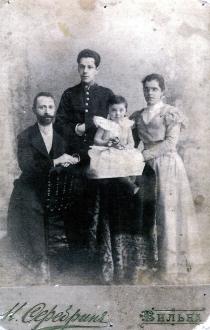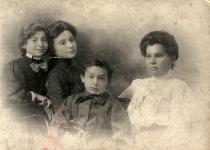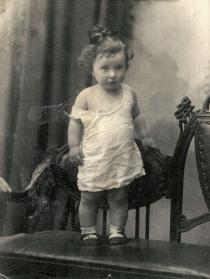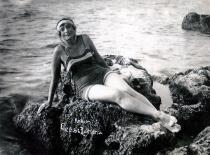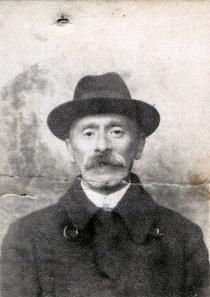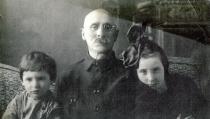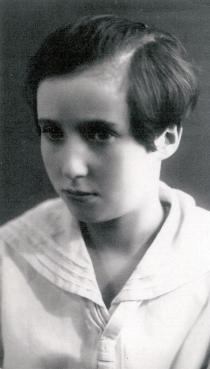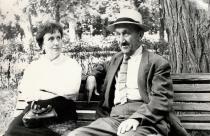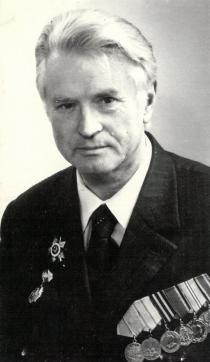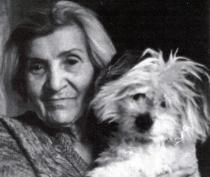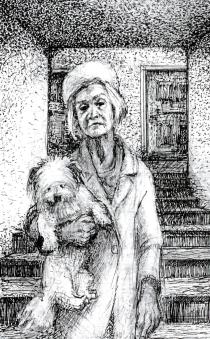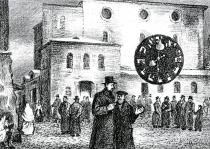My husband Andrei Sobolev. The photo was taken for the Board of Honor at the Institute in Lvov in 1975.
I met Andrei at the Art College. He was born to a family of workers in Kologriv, in Kostroma region, Russia, in 1914. We liked each other, although our friends thought we were very different. There was no love between us and no love affair. We liked one another, but everybody else saw how different we were. His friends used to say, 'Ira is a nice girl and we have nothing against her, but a dove and a crow are no match'. Andrei told me what they said but he took no notice of it. We saw each other out of boredom sometimes. We met and went to art exhibitions or to the cinema. He took me home and we perhaps kissed a few times, that's all. We were just friends. In 1939 Andrei was recruited to the army. He had no family in Moscow, and I kept his company before he went to the army. We made no promises. From there he wrote me letters and I wrote back.
During World War II I was in evacuation in Ashgabat with my mother, her sister, Aunt Maria and my grandmother. All this time I kept writing letters to my friend Andrei . He served his mandatory term of two years before the war and then was in the army for another five years. We got closer to each another through our letters. He was eager to become an artist. When he was in the army he was offered to be a professional military, an officer, but he refused. During the war he was a communications specialist. Sometimes he was sitting on a tree and made sketches of the enemy's disposition.
In 1944 we decided it was time to return to Moscow. Aunt Maria was the first to go. She managed to get her room in our apartment back. I returned to Moscow and stayed with aunt Maria for some time. I entered the Moscow Art Institute in 1944 and got a chance to move to the hostel for art workers.
One day when I was on a visit at my aunt Maria's, the door opened and a lean and thin body in a torn overcoat came in. I looked and ran to him exclaiming, 'Andrei!' We kissed. He knew my aunt's address and had come to her hoping to get information about me. This was the only place he knew in Moscow. I was very happy to see him. That same night he suggested that we should live together. We had such a happy life together. I thank God for sending me such a wonderful friend. We got officially married four years later. All this time I lived in the hostel for girls and he lived in the hostel for boys. Andrei entered the Institute for Applied Arts.
Later Andrei and I moved to my mother in Riga. I didn't have a job in Moscow and we didn't have a place to live. We decided to move there on a temporary basis. I didn't want to stay in Riga forever. I never liked Riga. We lived from hand-to-mouth there. Our daughter Anna was born in Riga in 1949. Anna was a very thin and weak baby, and we were afraid that she would not survive. I breastfed her for eleven months. By that time Andrei graduated from the institute and got a job assignment in Lvov.
In Lvov we were received coolly at first. But I don't think that it had anything to do with anti-Semitism. They treated all moscals that way. [Moscals is a slang name for Russians of Western Ukraine.] But in the early 1950s, during the undisguised anti-Semitic campaign, all Jews were accused of Zionism and fired from the institute. They created unbearable conditions for me at work and I had to quit. Andrei followed me. We went to work at the Art College in 1951 and worked there for seven years until representatives from the Institute of Applied and Decorative Art found Andrei and asked him to return to the institute. He became head of the department of art glass and held it for many years. He died in 1984 due to heart trouble.

